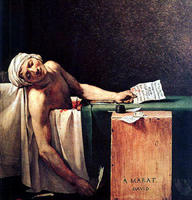
"
-James Berry
The past is a part of identity, whether you are speaking of a person, a family or a nation. True progress can only be made with true knowledge of the past—a knowledge that understands, learns from, and even forgives the errors of the past. The current constitution and policies of the European Union are the fruit of a collective of cultures running from their identity. They are trying to escape from the statues of history that stare them down as they walk the streets in shadows of guilt that generations have passed on to them. Their past stares them in the face all day. So they run through policies that would appear to prevent the past from ever happening again, when, in reality they become the very thing from which they are running. They run from bigotry, yet destroy the person and the family. They run from Christianity, yet destroy their culture. They run from tyranny, yet suffocate democracy.
All this stems from a poor anthropology and a failure to accept an identity. Truly understanding a cultural identity and its history is the only way a society can be freed from the chains of fear of the past. A society must learn to forgive the errors of their fathers and their institutions. Using time as an ally they can discover which institutions produce fruit that aids the culture and which institutions strangle it, and thus the person.

Niall´s mention of ´guilt´ is an interesting point, and opens the door to another question. How did the governments in Europe became so powerfully centralized in the first place. It seems that a common strain that runs through individuals within Socialist societies is a strong feeling of guilt. They see themselves as unworthy or underserving of the things they possess. Witnessing all the poverty in the world at large, and within their own societies, they are deeply disturbed and in the end feel personally responsible. To remedy this self-imposed complex, they empower the government (rather than take action themselves) with more power and money to solve the many problems they blame themselves for creating; poverty, disease, pollution, etc. They believe the government to be more capable of handling charity than the individual. Ultimately, this solution is rooted in laziness, wanting to avoid personal responsibility and initiative. It is much easier if the government siphons off an individual´s money, rather than the individual having to take the time to donate or contribute money on his own time. This is also common among the American Left. Many of their programs, ranging from universal health care, education, the environment, etc., have at their source a misplaced guilt complex. In Europe, it is obviously much more prevalent This explains why many European states are so powerful and top-down in their manner of governing. It also explains why so many on the world stage are critical of the United States, accusing it of being ´selfish´. We need only remember the last World Aids Summit, and the almost universal finger-pointing and criticism by other nations of the world. Also commonly found within such circles is an inherent distrust of free-market capitalism. Could there be a connection?
ReplyDeleteJefferson was correct when he stated that the natural tendency of a government is to grow. Thus more care was needed to prevent this from happening. For this reason, a system of checks and balances and separation of powers are a vital element to our Federal system.